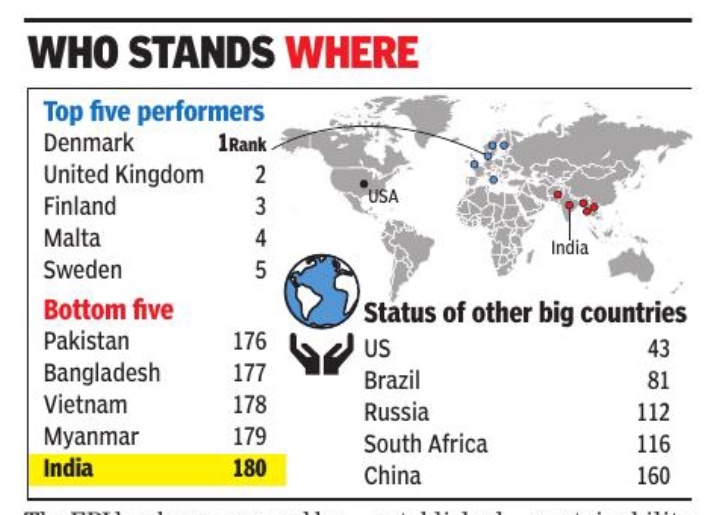Environmental Performance Index: South Asia
This is a collection of articles archived for the excellence of their content. |
YEAR-WISE DEVELOPMENTS
2018
Vishwa Mohan, Occupied 141st Slot Just Two Years Ago, January 24, 2018: The Times of India

From: Vishwa Mohan, Occupied 141st Slot Just Two Years Ago, January 24, 2018: The Times of India
See graphic:
Environmental Performance Index ranking, 2018
Poor handling of air pollution abatement and forest protection measures has seen India slip to the 177th position in green rankings in 2018. It was ranked 141st two years ago.
The latest global Environmental Performance Index (EPI) rankings, released on the sidelines of the World Economic Forum (WEF) meet in Davos, saw India fall to the bottom five in a list of 180 countries. The report ranks nations on 10 broad categories (issues), including 24 performance indicators, covering environmental health and ecosystem vitality (See graphic).
Air quality (household solid fuels and PM2.5 exposure) remained the leading environmental threat to public health and the report noted that countries such as India, China and Pakistan, which scored badly on this count, “face a public health crisis that demands urgent attention”.
On this front, India’s ‘Ujjwala Yojana’ — meant for LPG connections to women from Below Poverty Line (BPL) households — got a special mention in the report. If the goal of the scheme was realised, the report noted, it had the potential to positively impact the lives of millions by providing them with access to safe, affordable cooking technologies and fuels.
The biennial report, brought out by the Yale and Columbia universities in collaboration with the WEF, noted that the low ranking of emerging economies like India and China (120th) reflected the strain population pressure and economic growth imposed on the environment.
The decline in India’s ranking since 2016 can also be attributed to the quality of data and the broadening of the parameter base. The 2016 EPI was based on nine issue categories, including 20 performance indicators.
The good performers:
Switzerland leads the world in protecting the environment and using sustainable practices, followed by France, Denmark, Malta, and Sweden. In general, a higher rank shows a country’s longstanding commitment to protecting public health, preserving natural resources, and decoupling greenhouse gas (GHG) emissions from economic activity.
The report also cited Brazil (69th), suggesting that a concerted focus on sustainability as a “policy priority” would pay dividends.
India drops from 141/ 2016; 177/ 2018; to 180/ 2022
June 7, 2022: The Times of India

From: June 7, 2022: The Times of India
New Delhi : India has figured at the bottom of the 2022 Environmental Performance Index (EPI) ranking of 180 countries, released by USbased institutions.
The US, the largest historical polluter is ranked 43rd, while the current biggest emitter China has been ranked at the 160th position. Denmark, the UK, Finland, Malta and Sweden occupy the top five slots, with countries from south and southeast Asia are placed at the bottom five.
The ranking is based on an assessment of 40 performance indicators, including climate change, biodiversity, sustainable agriculture, environmental public health and greenhouse gas (GHG) emissions. India’s lowest rank is attributed to its air pollution and rapidly rising GHG emissions.
The EPI has been prepared by researchers of the Yale Centre for Environmental Law & Policy and the Centre for International Earth Science Information Network Earth Institute, Columbia University.
“These indicators measure how close countries are to meeting internationally established sustainability targets for specific environmental issues,” said the report carrying 2022 EPI.
Although the researchers claimed that most of the data used by them, were verified by a third party, the findings or such ranking practices are not fully accepted by the environment ministry in India, citing extrapolation of data and generalisation of conclusions that don’t factor in national circumstances. The authors of the rankings claimed that they do not accept data that comes directly from the government.
Referring to low-scoring countries such as India, Myanmar, Vietnam, Bangladesh and Pakistan, the report said, “Most low scoring countries are those that have prioritised economic growth over sustainability, or those that are struggling with civil unrest and other crises. “India, with increasingly dangerous air quality and rising greenhouse gas emissions, falls to the bottom of rankings for the first time. . . China and India are projected to be the largest and second-largest emitters of GHG in 2050, despite recently promising to curb emissions growth rates. ”